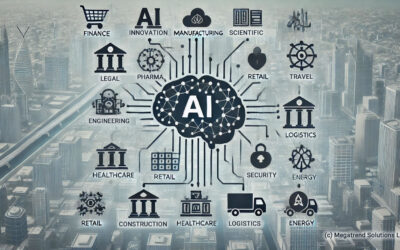Artificial intelligence (AI) is reshaping industries, driving innovations, and offering unparalleled opportunities for business growth. For senior executives, embracing AI can lead to transformative changes, from operational efficiency to enhanced customer experiences. However, the key to unlocking AI’s potential lies in understanding and assessing your business’s AI readiness. This readiness is more than just a technical requirement; it’s a strategic necessity that ensures you are well-prepared to integrate AI effectively into your operations.
What Is AI Readiness?
AI readiness refers to an organisation’s ability to successfully adopt and leverage AI technologies. It encompasses several critical dimensions:
- Data Availability and Quality: Data is the lifeblood of AI. The effectiveness of AI models depends on the availability of comprehensive, clean, and well-integrated data. Companies must assess whether they have access to the right data sources and if the data is of sufficient quality to support AI applications. This involves evaluating existing data collection practices, ensuring data is up-to-date, and addressing any gaps in data integration.
- Technological Infrastructure: AI technologies require a robust and scalable infrastructure. This includes modern hardware capable of supporting AI computations and software platforms that facilitate data analysis and machine learning model deployment. Businesses must review their current IT infrastructure to determine if it can meet the demands of AI solutions or if upgrades, such as cloud computing, are necessary for scalability and flexibility.
- Organizational Culture: Integrating AI is as much about people as it is about technology. Organisations need to cultivate a culture that embraces innovation and is open to new technologies. This involves addressing the workforce’s concerns about AI, offering training and education to improve AI literacy, and fostering a mindset that welcomes change and experimentation.
- Strategic Vision: AI should not be adopted in isolation but aligned with the company’s broader strategic goals. Executives must have a clear vision of how AI can support and enhance business objectives. This strategic alignment ensures that AI initiatives are purpose-driven and integrated into the company’s long-term plans, maximising their impact.
Assessing AI Readiness: Key Steps
- Evaluate Data Readiness: Begin by auditing your data sources to ensure they are adequate and of high quality. This involves checking for completeness, accuracy, and relevance of the data. Ensure data is integrated across various systems and departments, enabling seamless access for AI applications.
- Review Technological Capabilities: Assess your existing technology stack to determine its suitability for AI adoption. Identify gaps in hardware capabilities or software tools that could hinder AI deployment. Consider cloud-based solutions if your current infrastructure lacks scalability or flexibility.
- Analyze Organizational Preparedness: Gauge the readiness of your workforce and culture to embrace AI. Conduct surveys or focus groups to understand employees’ attitudes toward AI and identify any training needs. Develop strategies to foster a supportive culture for AI innovation.
- Align AI with Business Strategy: Define clear objectives for AI initiatives and ensure they align with your business strategy. Develop a roadmap that outlines how AI will be integrated into your business processes and how it will contribute to achieving your strategic goals.
The Benefits of AI Readiness
Achieving AI readiness is not merely a preparatory step but a strategic move that can deliver substantial benefits:
- Enhanced Decision-Making: AI enhances data analysis, enabling executives to make informed decisions based on real-time insights and predictive analytics. This leads to more accurate forecasting, better resource allocation, and improved strategic planning.
- Operational Efficiency: AI-driven automation can streamline processes, reduce operational costs, and increase productivity. By automating routine tasks, AI allows employees to focus on more complex and value-added activities, enhancing overall efficiency.
- Improved Customer Experience: AI enables personalised customer interactions, providing tailored recommendations, faster responses, and more engaging experiences. This leads to higher customer satisfaction and loyalty, driving growth and profitability.
- Competitive Advantage: Early adopters of AI can differentiate themselves from competitors by offering innovative products and services, improving operational efficiency, and responding more effectively to market demands. AI readiness positions businesses to capitalise on new opportunities and stay ahead in a rapidly evolving market.
Moving Forward: Your AI Journey
Understanding your AI readiness is the first crucial step as you consider AI for your business. It provides a clear picture of where you stand and what needs to be addressed to successfully integrate AI into your operations. Conducting a thorough AI readiness assessment will help you identify gaps, prioritise investments, and develop a strategic plan for AI adoption.
At Megatrend Solutions, we specialise in helping businesses navigate the complexities of AI integration. We offer a no-obligation online consultation to assist you in evaluating your AI readiness and exploring tailored solutions that align with your business goals. Schedule your consultation today and confidently embark on your AI journey, knowing that you are prepared to harness AI’s full potential for business growth.






